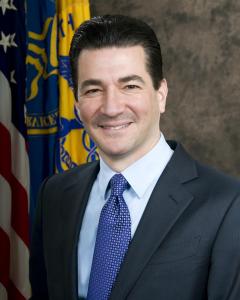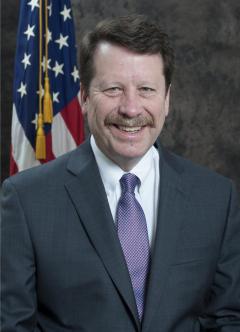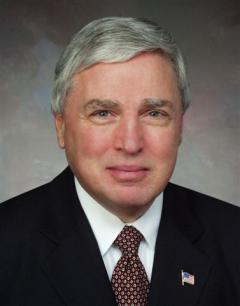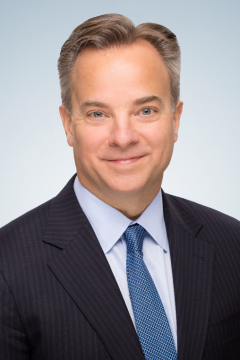Panel of Commissioners Discuss Evolution of FDA at Foundation's Public Meeting May 4th
Each year the Foundation conducts an annual meeting, open to the public, to discuss its activities and how it supports FDA. This year's meeting takes place May 4th, from 10 a.m until noon, at the law offices of Alston and Bird (950 F St. NW, Washington, DC) and concludes with a period for brief comments from the public, which can be submitted in advance by emailing eshaefer@reaganudall.org.
"Evolution of FDA Science and Engagement" - a panel discussion
After delivering a keynote address, current FDA Commissioner Dr. Scott Gottlieb will be joined by three former Commissioners for a panel discussion. All four speakers have played key roles in the evolution of FDA science and patient engagement and the biographies that follow outline a dedication to modernizing the Agency. Gottlieb served on the Senate Federal Health Technology Policy Committee. Califf led the Clinical Trials Transformation Initiative, McClellan was instrumental in IMEDS and von Eschenbach worked on regulatory pathway modernization through the Critical Path Initiative and the Food Protection Plan.

Scott Gottlieb, M.D., was sworn in as the 23rd Commissioner of Food and Drugs on May 11, 2017. Dr. Gottlieb is a physician, medical policy expert, and public health advocate who previously served as the FDA's Deputy Commissioner for Medical and Scientific Affairs and before that, as a senior advisor to the FDA Commissioner.
He also worked on implementation of the Medicare drug benefit as a senior advisor to the Administrator of the Centers for Medicare and Medicaid Services, where he supported policy work on quality improvement and the agency’s coverage process, particularly as it related to new medical technologies.
In 2013 Dr. Gottlieb was appointed by the Senate to serve on the Federal Health Information Technology Policy Committee, which advises the Department of Health and Human Services on healthcare information technology.
Dr. Gottlieb was previously a Resident Fellow at the American Enterprise Institute, and a Clinical Assistant Professor at the New York University School of Medicine in Manhattan, where he also practiced medicine as a hospitalist physician.

Robert Califf, M.D., MACC, is vice chancellor for health data science and director of Duke Forge – Duke’s new center for actionable health data science. He is the Donald F. Fortin, MD Professor of Cardiology in the Duke University School of Medicine, and an advisor for Verily Life Sciences, a member of the Alphabet family of companies formed by Google. Dr. Califf served in the administration of President Barack Obama as Deputy Commissioner for Medical Products and Tobacco in the U.S. Food and Drug Administration (FDA) from 2015-2016, and as Commissioner of Food and Drugs from 2016-2017.
Prior to joining the FDA, Dr. Califf was a professor of medicine and vice chancellor for clinical and translational research at Duke University. He was founding director of the Duke Clinical Research Institute. A nationally and internationally recognized expert in cardiovascular medicine, health outcomes research, healthcare quality, and clinical research, Dr. Califf has led many landmark clinical trials and is one of the most frequently cited authors in biomedical science, with 1,250 publications in the peer-reviewed literature. Dr. Califf is a member of the National Academy of Medicine (formerly the Institute of Medicine [IOM]). Dr. Califf has served on numerous IOM committees, and was a member of the FDA Cardiorenal Advisory Panel and FDA Science Board's Subcommittee on Science and Technology. Dr. Califf has also served on the Board of Scientific Counselors for the National Library of Medicine, as well as on advisory committees for the National Cancer Institute, the National Heart, Lung, and Blood Institute, the National Institute of Environmental Health Sciences, and the Council of the National Institute on Aging.
He has led major initiatives aimed at improving methods and infrastructure for clinical research, including the Clinical Trials Transformation Initiative (CTTI), a public-private partnership co-founded by the FDA and Duke. He also served as the principal investigator for Duke's Clinical and Translational Science Award and the NIH Health Care Systems Research Collaboratory coordinating center, and as co-PI of the National Patient-Centered Clinical Research Network (PCORnet). He currently serves as chair of the board of the People-Centered Research Foundation, a not-for-profit organization that is supporting and extending the work of PCORnet.

Andrew C. von Eschenbach M.D., currently serves as President of Samaritan Health Initiatives, Inc. and as an Adjunct Professor at University of Texas MD Anderson Cancer Center. From September of 2005 to January 2009 he served as Commissioner of Food and Drugs where he championed an agenda to modernize the FDA by process improvement of the regulatory pathway for drugs and medical devices and by fostering creative projects, including FDA’s Critical Path Initiative (designed to bring modern tools of science to the product development process); work plans like the FDA’s Food Protection Plan; and most especially the nurturing of the workforce through initiatives, such as an Agency-wide fellowship program and development of a new integrated campus for the Agency in White Oak, Maryland. Under his leadership, the FDA experienced dramatic increases in resources enabling implementation of many new programs designed to strengthen the FDA in its mission to protect and promote public health. He has emphasized FDA’s role in working with external partners to assure quality throughout the entire life cycle of the products it regulates.
Dr. von Eschenbach joined FDA after serving for four years as Director of the National Cancer Institute (NCI) at the National Institutes of Health where he set an ambitious goal to eliminate the suffering and death due to cancer by rapid acceleration and integration of the discovery-development-delivery continuum. While at NCI, he committed resources to ensure the application to oncology of nanotechnology, genomics, proteomics, bioinformatics, and other emerging technologies. At the time of his appointment by President Bush to serve as Director of NCI, he was President-Elect of the American Cancer Society. Dr. von Eschenbach entered government service after an outstanding career over three decades as a physician, surgeon, oncologist and executive that included numerous leadership roles from Chairman of the Department of Urologic Oncology to Executive Vice President and Chief Academic at the University of Texas M.D. Anderson Cancer Center in Houston, an institution world renowned for the magnitude and excellence of its clinical and research cancer programs. An internationally renowned cancer specialist and author of more than 300 scientific articles and studies, Dr. von Eschenbach has served in numerous leadership roles, including serving as one of the founding members of the National Dialogue on Cancer.

Mark McClellan, M.D., is the Robert J. Margolis Professor of Business, Medicine, and Health Policy, and Director of the Duke-Margolis Center for Health Policy at Duke University with offices at Duke and in Washington DC. The new Center supports and conducts research, evaluation, implementation, and educational activities to improve health policy and health, through collaboration across Duke University and Health System, and through partnerships between the public and private sectors.
Dr. McClellan is a doctor and an economist, and his work has addressed a wide range of strategies and policy reforms to improve health care. Before coming to Duke, he served as a Senior Fellow in Economic Studies at the Brookings Institution, where he was Director of the Health Care Innovation and Value Initiatives and led the Richard Merkin Initiative on Payment Reform and Clinical Leadership. Dr. McClellan is a former administrator of the Centers for Medicare & Medicaid Services (CMS) and former commissioner of the U.S. Food and Drug Administration (FDA), where he developed and implemented major reforms in health policy.

Susan Dentzer is the President and Chief Executive Officer of the NEHI, the Network for Excellence in Health Innovation, a nonprofit, nonpartisan organization composed of more than 100 stakeholder organizations from across all key sectors of health and health care. She previously served as senior policy adviser to the Robert Wood Johnson Foundation. Prior to that, she was editor-in-chief of the journal Health Affairs, and from 1998 to 2008, she served as the on-air Health Correspondent for the PBS NewsHour. Dentzer is an elected member of the National Academy of Medicine and the Council on Foreign Relations. She is a member of the Board of Directors of the International Rescue Committee, a leading humanitarian organization; a member of the board of directors of Research!America, which works to advance research to improve health; and a member of the board of directors of the Public Health Institute. She is a fellow of the National Academy of Social Insurance and the Hasting Center, an institution dedicated to bioethics and the public interest. She previously served as a public member of the American Board of Medical Specialties.
